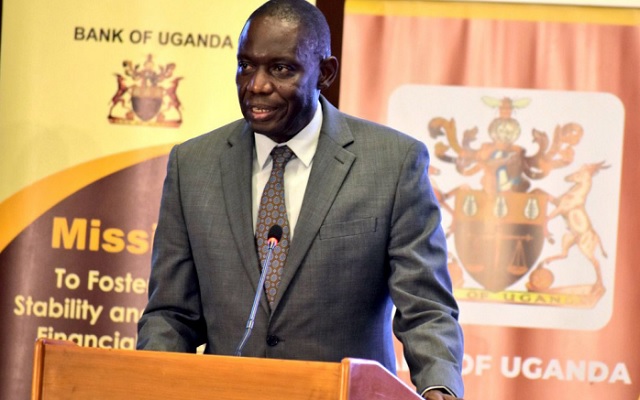
Analysts say new BoU boss has done well so far
Kampala, Uganda | IAN KATUSIIME | After steering the Central Bank for two years in acting capacity since then Governor Emmanuel Tumusiime Mutebile passed on in January 2022, Michael Atingi-Ego has been receiving positive ratings in monetary policy circles.
Michael Atingi-Ego is an accomplished PhD economist who addresses monetary policy issues like a confident old hand. Whether asked by journalists, speaking at official events as Governor, or in less formal settings, Atingi-Ego, does not shy away from holding forth on intricate policy issues.
Based on his background, including a spell as deputy director of the African Department (AFR) at the International Monetary Fund (IMF) and as head of the Macroeconomics and Financial Management Institute of Eastern and Southern Africa (MEFMI) in Harare, Zimbabwe, Atingi-Ego’s depositions often reveal a deep understanding of how international events affect the Uganda’s monetary sector and economy.
Atingi-Ego sharp grasp of monetary policy issues and steady grip at the helm as Acting Governor has, however, done little to tamp down speculation on whether he will `eat’ the top job. President Yoweri Museveni has kept many guessing on whom he will appoint as substantive Governor.
Atingi-Ego had been Deputy Governor for two years before he took on the top job in acting capacity two years ago. Over that period, Atingi-Ego has steered the central bank’s performance in the midst of tough economic times marked by slow recovery from Covid-19, rapid monetary expansion, increasing fiscal indiscipline, and corruption scandals. As 2024 enters month two, Atingi-Ego must be priming himself for the monetary mischief in the run-up to the general election two years away. Meanwhile, analysts are studying and debating his every move.
The tumult under former Governor Mutebile is fresh in many people’s minds and it has also been a parameter in which many observers keep watch on his replacement. When Atingi-Ego was appointed Deputy Governor in 2020, many felt he would be taking over the reins because Mutebile’s health was failing.
Uganda was dealing with the covid-19 outbreak and the 2021 presidential election was looming. In an interview to NTV, Atingi-Ego offered some of his thoughts on the usual economic issues. On cutting expenditure, he commented, “You may cut expenditure but if you are not directing it to the productive areas, you are not doing anything.”
“Given past precedent, he is holding the fort well,” says Geoffrey Onegi Obel, an economist and renowned investment banker who closely watches monetary policy although he says it is too early to score the Acting Governor’s record.
“To evaluate Governor Mutebile’s record, you have to plot the chart of the Uganda shilling against foreign currencies from the time he took over,” says Obel , citing currency performance as the standard for determining the success or failure of monetary policy. He says of all the Central Bank infrastructure, the Monetary Policy Committee (MPC) is the most important. “If the MPC is not effective, there will be a problem.”
Onegi adds that Atingo-Ego’s previous stint in the Research Department of BoU puts him in good stead. “His biggest task is financial sector deepening. All his predecessors did not succeed much,” Obel says. He adds that the Governor has to create more financial instruments like longer tenure bonds which he describes as moving away from carrying cash and shrinking the huge informal sector.
“Cash is the most expensive instrument for intermediation,” says the former Chairman of Uganda’s National Social Security Fund (NSSF).
Dual mandate
“Central Banks have a dual mandate; to make sure policy/interest rates are balanced; not too high and not too low. That’s what makes governors sweat,” Onegi says. “They also have to ensure that the rates create jobs. Most have failed on the second mandate.” He adds that the public do not usually task the central bank on the impact of policy rates on jobs.
Internationally, it is a torrid time for central bankers. There is still wide spread angst over the global financial crisis of 2008 and other latter day crises like the pandemic and payouts taken by fat cats of the banking industry with the accusation that central banks enable this kind of behavior and sanction it.
Stephen Kaboyo, MD of Alpha Capital Partners, a firm focusing on forex trading strategies, says the new Governor has done well. “Dr Ating Ego has carried the mantle for two years now and in my view he has done relatively well leading the team at Central Bank,” he told The Independent.
“He has demonstrated technical competence, excellent cognitive ability, stakeholder management and social capital, attributes that are key to run a Central Bank.”
Kaboyo said that the Acting Governor’s performance can further be assessed on how well the Central Bank has been able to meet its statutory mandate in the past two years.
“One primary metric is the tenacity in implementing monetary policy that was able to deliver lower inflation from double digits to as low as 2.8%. That in itself is a great achievement considering the fact that peer economies are struggling to contain inflation. In addition the financial system has been stable in the last couple of years,” says Kaboyo who formerly worked as Director Financial Markets at Bank of Uganda.
He adds that generally, the Central Bank Governor is responsible for fostering financial stability, macroeconomic stability, ensuring that the financial sector provides funds for production of goods and services thus leading to economic growth among others.
The current environment at the central bank is a different era from the time bank officials were torn apart by the infighting between Mutebile and his deputy, Louis Kasekende. The fight drew bank employees in two camps causing animosity and to some extent paralysing bank operations.
BoU staff would also spend days consumed by court cases in the battles with tycoon Sudhir Ruparelia over the sale of Crane Bank. The leadership fights and the Sudhir case dragged on for years causing reputational damage and unwanted publicity for an institution that was known for calm and steady management.
Besides the court battle, the central bank was also haunted by a parliamentary inquiry by the Committee on Statutory Authorities and State Enterprises (COSASE) which investigated the Bank’s operations and procurements such as excessive expenditure on private law firms defending the bank despite having a fully-fledged legal department, and even minor items like purchase of pens at exorbitant prices.
Mutebile’s record
But just like Mutebile, Atingi-Ego is Governor in an era when Central bank chiefs cannot escape media attention and if anything can be brought down by it. On January 22, Politico Europe reported on a trade union survey where 50% of staff of the European Central Bank rated the performance of the bank president Christine Lagarde as “very poor.” The poll by IPSO surveyed over 1000 staff of the ECB who reportedly complained that she meddled too much in politics and used the bank to boost her personal agenda. Those accusation are nothing uncommon.
For instance, insiders say Atingi-Ego’s former boss, the late Mutebile had put a personal stamp on the central bank where he had worked as Governor for twenty years. Mutebile was appointed Governor in 2001 and his contract was renewed five times including 2021 when he could barely walk as his health continued deteriorating.
Mutebile, a former Permanent Secretary at the Ministry of Finance, was praised locally and internationally for his philosophy of the private sector-led economy that he brought to BoU. He was acclaimed for his confidence and boldness including when challenging the president on economic theory and practice.
But the late former Governor also drew controversy in 2011 when he said he consented to the withdrawal of over $700m from the Consolidated Fund to buy Russian fighter jets after President Museveni promised him that the funds would be replenished with oil revenue.
There were calls for Mutebile’s resignation but the Governor had the President’s confidence and he stayed put. More controversy was to follow then with the revelation that Bank of Uganda had ordered for the compensation of businessman Hassan Basajjabalaba with over 180billion to pay for his debts and other arrears.
The Mutebile era is long ended but there are persistent calls for Museveni to appoint a substantive Governor, with economists and analysts arguing that such an institution as the central bank, should not operate in a cloud of uncertainty.
 The Independent Uganda: You get the Truth we Pay the Price
The Independent Uganda: You get the Truth we Pay the Price



